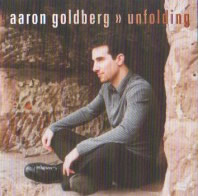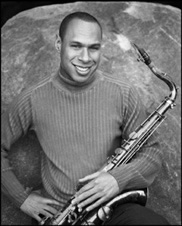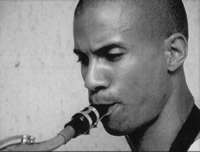|
|
- AB:I wanted to
ask you about jazz pedagogy and learning jazz. But first, and
I guess this is somewhat related, consider the commercial viability
[of jazz] and the people you mentioned building these tunes
off
these very complicated harmonies or rhythms or forms. That is
a very “artsy” gesture and it’s very demanding
on the listeners. Commercial viability means, to a certain
extent—or
does it?—tempering it to
make it more accessible? What is the relationship you perceive
with
your listeners?
- AG:
I would say that there is not a direct relationship between the
complexity of a given piece of music—be it rhythmic, harmonic,
melodic, or whatever—and its ability to reach an audience.
I think jazz audiences are more sophisticated than you give them
credit for. First of all, there will always be a huge segment
of the population that will just have no interest in what we do.
And I think that’s a given, whether it’s due to a lack
of education, or because people get addicted to whatever’s
popular in the day—Britney Spears, the latest hip-hop, or
whatever. They’re just not interested in anything else and
that’s cool. Jazz is an acquired taste anyway. Some of them
could potentially fall in love with jazz. But will they be exposed?
Most of them, probably not.
- Now, that being said, it leaves the other 10 or 20 percent of
the people, or 40 percent in a different country, who may potentially
be interested in jazz. Say only 2 or 3 percent of those already
have a certain amount of jazz knowledge and exposure. Those are
the people who may indeed clue more directly into the specific
harmonic information in a tune.
|
- They might actually enjoy some of the complexity. Then the other
8 percent of those 10 percent, those people probably have the
ability to respond to complex music. Now it might not be
jazz: it might be classical music, or the hippest hip-hop that
they listen to now. But they have the ability to process complexity.
So there is your target audience: that 10 percent of the people
who have specific jazz knowledge or don't but do have the capacity
to enjoy, process, and become fascinated with it.
- Maybe, some are like me when I was a Milton Academy sophomore
and I heard jazz for the first time. As soon as I heard it I was
totally into it—I was one of those sleeping 8 percent. If
your music has the good fortune, for whatever reason, to become
appreciated by an additional 10 percent, or an additional
20 or 30 percent—great, you’re psyched. But that’s
going to be chance. Somebody like Joshua Redman was in the right
place at the right time. He has a good story, he’s good looking,
he’s well spoken, and he came along at a time when the media
was paying attention to jazz. Who knows? He had, for a brief time
at least, a wider exposure than other people. But most performers
are not going to ever appeal to more than 10 percent of the people.
- I don’t think you really have to worry so much about being
commercially viable as a jazz artist on a grand scale, only on
a small scale. Each person has the individual responsibility to
be true to their own artistic vision—this is the way I look
at it. Finding your musical self is the number one rule for every
jazz musician, and this means compositionally, conceptually, artistically
in all senses, especially improvisationally. Some of us are going
to naturally gravitate towards a style that’s accessible
to a larger percentage of the people. Others are going to naturally
develop in such a way that they become fascinated with maybe slightly
more challenging or less accessible forms or structures or styles.
That’s the way it should be, ultimately.
|
|
|
Tenor Saxophonist Joshua
Redman
|
- Somebody like Joshua Redman is always going to be more accessible
to a wider percentage (of that already admittedly small percentage)
of the people versus somebody like Mark Turner, who is in every
way Redman’s musical equal. They admire each other, and respect
each other, and they’re friends. But, Josh will always have
a so-called bigger and more successful career because his musical
personality is simply just more accessible than Mark’s. That
is in part because of the music they write, it’s in part
because of their stage presence, and it’s in part because
of their life priorities. Josh is just going to be more of a money-making
proposition than Mark. That being said, it would be wrong for
Mark to change his personality to be more like Josh, and it would
be wrong for Josh to change his personality to be more like Mark.
They are both great musicians precisely because they’ve tried
to be themselves, and so long as they continue to be themselves,
they will do just fine. And they will leave something for the
next generation to follow.
- When I try to think about my own music and whether it will reach
an audience, I have to only trust that what I think of as great
is going to be great for some other people. It may be that’s
great for a thousand other people, maybe
|
|
|
Tenor Saxophonist Mark
Turner
|
that it's great for ten other people, or maybe that it’s
great for 100,000 other people, or for a million other people.
A lot of that will probably depend on how it’s marketed,
on luck, chance, business...but some of it will depend on my artistic
personality and how accessible it is. Another part will depend
on how magnetic of a show I give. Sometimes I play with great
bands and great guys and the people are kind of lukewarm, and
other times I play with equally great guys and the people are
going crazy for no other reason that some people just have these
magnetic stage personalities—Josh was a prime example of
that. Wynton, he’s a great musician and he has stage magnetism;
the second he gets on stage, picks up the trumpet, people are
riveted. That’s just something that he’s always had
and he’s going to continue to have. He exudes charisma and
charm, and it’s a major source for his success. But that
stuff is out of your hands and ultimately your responsibility
is to your musical agenda.
- AB: Even if
you might never reach the other 90 percent of the people?
- AG: Yes, I think your
goal should be to reach all of that 10 percent. If you can reach
all of that
10 percent you are going to have a great career…
- AB: …and presumably
be content and happy and fulfilled?
- AG: Totally,
totally. Unless you went in it for the wrong reasons, unless you
went in it to become famous. But the only people who become famous
or huge, they are not jazz musicians. And even the most "famous"
and "huge" jazz musicians are not famous and huge in
grand scheme of things. Wynton Marsalis is not famous and huge,
neither is Branford [Marsalis], neither is Joshua, neither is
Sonny
Rollins, neither is Herbie Hancock in the grand scheme of
things. The vast majority of people have never heard of Herbie
Hancock. But, he’s been able to reach, say, 20 percent of
the people. That’s quite an accomplishment and he deserves
credit for that.
- AB: But it was
a high toll…he got a lot a crap.
- AG: But he doesn’t
give a fuck about it. If you interviewed him, he wouldn’t
say it took a high toll, absolutely not. He would say he was
having
fun and he was always trying to move with the times and do something
new and different. And I think that on the contrary, that movement
is what’s
kept him vital as opposed to him having paid a price for experimentation.
- AB: I want to
return to pedagogy and learning jazz. We both went through this
very unusual high school program with small combos and a heavy
emphasis on improvisation. I haven’t been playing a lot
of drums lately, but I have been studying guitar and there
is
so much you can learn from private teachers and records and that
is important, but there is definitely bandstand experience.
But,
learning to play jazz is so institutionalized. This is a relatively
recent phenomenon and I have heard various opinions about the
kinds of musicians it produces. Do you think something happens
when it gets institutionalized? Suddenly you have degree requirements
and juries and school stuff as opposed to learning on the bandstand,
or learning with private teachers, or small groups, like the
John Payne Center in Brookline, Massachussetts. You have
seen a lot, was it all as valuable? Were there certain things
frustrating
about particular aspects [of your educational experiences]?
- AG: The things
that are wrong with institutional learning in a jazz context
are
the things that are wrong with institutional learning in every
context. And the things that are right about it are the things
that are generally right. I don’t think there is a particularly
poor fit between jazz and academia, so to speak. I think that
you can potentially learn a lot from any class you take in university.
When you do learn, it's because either a) you are extremely
interested in the material at hand, or
b)
you have a great professor—or both, if you were lucky.
Ultimately the same is going to be true of every jazz class
as well.
Basically, any kind of exposure you get to jazz is good because
ultimately it is the kind of thing you have to learn on your
own.
As it is true of every field of higher learning, in every challenging
field, it’s going to come down to…
- AB: …you
in the practice room?
- AG: You in the
practice room, you in front of your stereo, you reading a book,
if we're talking about another field. Art cannot
be taught in a classroom setting in any kind of definitive
way—it
can only be introduced. In so far as institutions succeed in
introducing
people to concepts, new music they haven’t heard before,
a method of learning, they are doing their job and it’s
going to be up to the student to make it happen beyond that.
I think that
it’s wrong to demean all institutions, to say there is
no place for the institution in jazz. I think if you talked
to a
lot of old guys, they feel that all these kids are lucky to get
their exposure to this music in that kind of setting. What they
don’t tell you is well, “that’s not enough.”
Students sometimes think they are going to be handed
everything, and that suddenly they are going to become a great
jazz musician. The truth is no jazz musician learned to play
that way, even if they were handed valuable information by their
friend
or by their mentor. It doesn’t matter whether someone acquires
information in a classroom setting or in a private setting,
in
a John Payne Center, somebody’s loft space, or from their
grandfather who handed down the music directly to them. Just
acquiring information
is not enough; you have to learn to apply it, you have to practice
it, you have to develop it into something your own. I think
you and I
had a teacher who taught us that principle: that basically it
came down to you and how hard you want to work.
- If there is any downside to the institutional teaching of jazz
it’s only that perhaps there’s a danger students
could become lazy and think it will all just be handed to them,
that
they will emerge from their institution fully formed as a swinging
killing cat. That obviously doesn’t happen. On the
other hand, certain people do emerge from music schools sounding
great, but
if you ask them why, they’ll tell you in a second it’s
because they practiced and not just because they went to class
and got As.
|
|
|
|
|
|
Articles
|
|
|
|
Interview
|
|
Berish: Dissections and Intersections
|
|
Review Essays
|
|
|
|
Reviews
|
|
|
Conference Report
|
|
|
|
|
|
|
|
|




|










